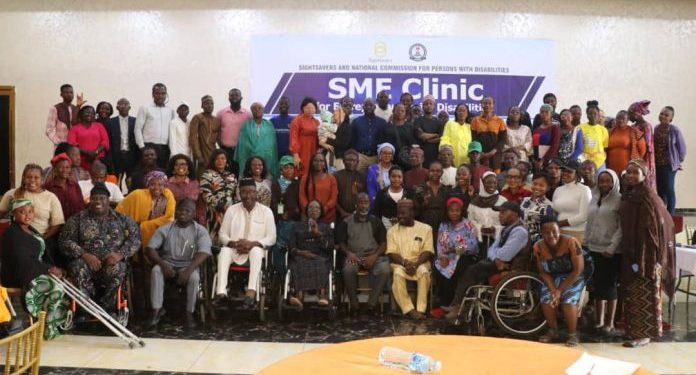In a landmark move to promote economic inclusion, the National Commission for Persons with Disabilities (NCPWD), in partnership with Sightsavers Nigeria, hosted a two-day Small and Medium Enterprise (SME) Clinic for entrepreneurs with disabilities in Abuja. The event, held at the Exclusive Serene Hotel, brought together participants from diverse disability groups across Nigeria, underscoring a growing national push towards equity, empowerment, and inclusive growth.
The clinic focused on strengthening the entrepreneurial capacity of persons with disabilities (PWDs), equipping them with the skills, tools, and networks needed to thrive in Nigeria’s evolving economy.
Executive Secretary of NCPWD, Hon. Ayuba Gufwan, reaffirmed the Commission’s commitment to removing barriers for entrepreneurs with disabilities and creating a level playing field. He praised Sightsavers Nigeria for its continuous support in improving the wellbeing of PWDs, adding that empowerment must go beyond inclusion to ensure real economic self-reliance.
“Our goal is to ensure that persons with disabilities are not just included but empowered to be self-reliant contributors to the nation’s economy,” he said.
Echoing his message, Country Advocacy Coordinator at Sightsavers Nigeria, Esther Bature, highlighted the transformative role of inclusive economic initiatives. She emphasized that empowering PWDs through entrepreneurship supports wider goals of job creation, innovation, and national resilience.
“SMEs are the backbone of any economy. By supporting persons with disabilities to become successful entrepreneurs, we’re not only fostering personal development but also driving job creation and community resilience,” she said.
Representing the Honourable Minister of Labour and Employment, Mrs. Ngozi Florence Onyeani, Director of Labour and Social Security, commended the NCPWD and Sightsavers for organizing the clinic. She noted that the initiative aligns with the Ministry’s focus on inclusive employment and economic opportunities for all Nigerians, especially the most vulnerable.
Throughout the clinic, participants engaged in practical sessions and received expert business advice from key regulatory and support agencies, including the Standards Organisation of Nigeria (SON), National Agency for Food and Drug Administration and Control (NAFDAC), Corporate Affairs Commission (CAC), and the Small and Medium Enterprises Development Agency of Nigeria (SMEDAN).
The event concluded with participants sharing personal experiences and business challenges, sparking renewed commitments from stakeholders to partner with the NCPWD in building inclusive, economically vibrant communities of persons with disabilities across the country.










